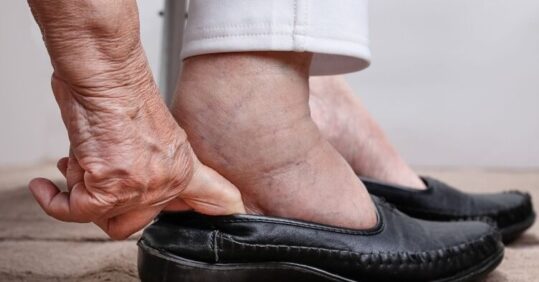Mythbuster: ‘Her ankles are very swollen – she needs water tablets’

GP Dr Peter Bagshaw explains why it is important to avoid inappropriate use of diuretics in ankle oedema
It’s a common scenario in primary care for GPs to be asked to prescribe ‘water tablets’ – diuretics – to elderly patients with swollen ankles. Carers, the patients themselves, and even healthcare professionals often believe that diuretics are a suitable treatment to relieve the swelling symptoms, irrespective of the underlying cause.
The reality
Ankle oedema in this age group is very common and is most usually due to immobility. 1 In most such cases, diuretics will not help and are not appropriate.2 Diuretics are the commonest cause of side-effects in older people, including weakness, confusion, postural dizziness, falls and fits. Around 20% of people taking them develop hyponatraemia and 5% develop hypokalaemia. 3 They also make people urinate frequently – further increasing the risk of falls for elderly people, as it makes them rush to the toilet.
Related Article: Measures to prevent cancer would be cost-effective, suggests economic report
One study found a fifth of over-65s were on diuretics, often without benefit, and with significant risk of harm.3 As other researchers observed: ‘Elderly people with bilateral leg oedema are very often simply treated with diuretics. The adverse drug effects caused by diuretics can be harmful, especially in geriatric patients treated with many different drugs.’4
Heart failure can be an underlying cause of ankle oedema, but there are a number of other differentials including cirrhosis, renal disease, venous insufficiency, lymphatic system disease and protein deficiency. Swollen ankles can also be a side effect of medications that are widely used in older people, in particular calcium channel blockers such as amlodipine and nifedipine, but also corticosteroids, gabapentin, pramipexole and NSAIDs.1
What is the right approach?
Effective treatment depends on knowing the cause. Drug-induced oedema is often apparent from the history, while lymphoedema is generally non-pitting, unlike the pitting oedema associated with chronic venous insufficiency or heart failure.
Basic investigations include B-type natriuretic peptide, a full blood count, and renal and liver function tests as a minimum.5
That process should provide a diagnosis and lead to rational treatment. In medication-induced swelling, diuretics are not effective; reducing or stopping the medication is the only answer. In lymphoedema, diuretics are rarely effective long-term and it is best addressed by compression bandaging, good skin care, exercises and manual lymphatic drainage. In chronic venous insufficiency, diuretics are inappropriate, with elevation and compression the effective treatments.2
Related Article: Mythbuster: ‘I don’t need a smear test – I’ve had my HPV jab’
Remember that if swelling is unilateral, the differential diagnosis is very different: it is important to exclude a deep vein thrombosis, and I have also seen it as a presentation of cancer, restricting lymphatic drainage.
Caveats
There are also occasionally scenarios – for example, the very elderly, obese and immobile patient with very swollen, sometimes leaking legs – where a short course of a diuretic might be reasonable to trigger improvement and the application of more appropriate treatments. However, this needs a clear documentation of the strategy and the avoidance of defaulting to thoughtless repeat prescriptions.
Key points
- Many older people may be on diuretics for swollen ankles inappropriately
- Diuretics will not usually help and come with the risk of serious side effects in the elderly, including postural dizziness and falls
- ‘Leg swelling’, ‘oedema’ or ‘pitting oedema’ are descriptions, not a diagnosis
- A few basic tests are worthwhile to find the cause of the swelling
- The commonest cause is dependent oedema (pooling of fluid due to gravity), not heart failure
- Diuretics will not help in dependent oedema, drug-induced oedema or lymphoedema
References
Related Article: Smoking rates fall most significantly in the North of England
- Mayo Clinic. Edema.
- O’Brien J, Chennubhotla S, Chennubhotla R. Treatment of edema. Am Fam Physician 2005;71:2111-7
- MacClennan W. Diuretics in the elderly: how safe? BMJ 1988; 296:1551-2
- Thaler H , Wirnsberger G, Pienaar S et al. Bilateral leg edema in the elderly. Clinical considerations and treatment options. Eur Geriatr Med 2010;1:353-7
- Bunden W. The chronically swollen leg: finding the cause. In Venous Ulcers. Bergen J, Shortell C (eds). Elsevier Academic Press 2006
Dr Peter Bagshaw is a GP in Somerset

See how our symptom tool can help you make better sense of patient presentations
Click here to search a symptom




